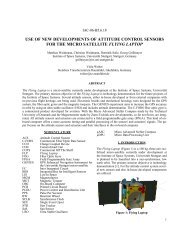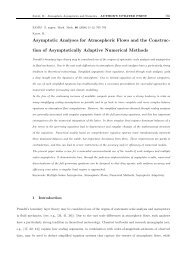New Statistical Algorithms for the Analysis of Mass - FU Berlin, FB MI ...
New Statistical Algorithms for the Analysis of Mass - FU Berlin, FB MI ...
New Statistical Algorithms for the Analysis of Mass - FU Berlin, FB MI ...
You also want an ePaper? Increase the reach of your titles
YUMPU automatically turns print PDFs into web optimized ePapers that Google loves.
5.3. QAD GRID PLATFORM SERVER 127<br />
<strong>the</strong> current version <strong>of</strong> <strong>the</strong> worker is transferred as a zip archive and<br />
unzipped into a new sub-directory.<br />
5. Fur<strong>the</strong>r commands - as stored in <strong>the</strong> database <strong>for</strong> this kind <strong>of</strong> worker -<br />
are executed.<br />
6. The worker is started via <strong>the</strong> worker specific command line stored in <strong>the</strong><br />
QAD Grid’s database during registration (see section 5.5.2.<br />
Task Scheduling and Provision<br />
One <strong>of</strong> <strong>the</strong> central functions <strong>of</strong> <strong>the</strong> Grid plat<strong>for</strong>m server is to provide jobs and<br />
<strong>the</strong>ir respective details <strong>for</strong> workers. This means, <strong>the</strong>re must exist two basic<br />
functions on <strong>the</strong> plat<strong>for</strong>m server:<br />
� Receive jobs from some instance and insert <strong>the</strong>m into <strong>the</strong> central job<br />
queue. The jobs can be send from some (authorized) worker or from a<br />
Grid plat<strong>for</strong>m itself where a user has started an analysis that results in<br />
a set <strong>of</strong> jobs.<br />
� Provide jobs to workers: each authorized worker can request jobs <strong>of</strong> a<br />
particular kind from <strong>the</strong> server (see below). A job contains all needed<br />
in<strong>for</strong>mation <strong>the</strong> workers needs, such as algorithm parameters, location<br />
<strong>of</strong> data to be analyzed etc.<br />
Job/Worker Matching<br />
Each worker can handle exactly one particular kind <strong>of</strong> job, such as copy a file,<br />
per<strong>for</strong>m an analysis or classify an item (see section 5.4). Hence, each job and<br />
each worker is assigned a so called job type id (JTI) tag. If a worker requests<br />
a job it sends its JTI tag and <strong>the</strong> plat<strong>for</strong>m server checks if unprocessed jobs<br />
tagged with this JTI exist. If this is <strong>the</strong> case <strong>the</strong> first job in <strong>the</strong> queue is marked<br />
“in progress” and <strong>the</strong> parameters transferred to <strong>the</strong> requesting worker.<br />
Requesting Data<br />
To handle a task a worker mostly needs a dataset to e.g. per<strong>for</strong>m an analysis<br />
on. This data is stored at <strong>the</strong> central Grid server and usually at some workers<br />
within <strong>the</strong> Grid. To get this data <strong>the</strong> worker queries <strong>the</strong> plat<strong>for</strong>m server to<br />
get a list <strong>of</strong> all nodes that currently host that particular dataset. The request<br />
includes <strong>the</strong> geographical location and <strong>the</strong> id <strong>of</strong> <strong>the</strong> needed dataset. The<br />
resulting list includes <strong>the</strong> machine’s IP addresses ordered by <strong>the</strong> (geographical)<br />
distance to <strong>the</strong> requesting worker. We could also have used <strong>the</strong> upload speed<br />
<strong>of</strong> <strong>the</strong> target as order criterion but as hosting nodes must have a large upload<br />
bandwidth <strong>the</strong> geographical location is considered to be more important to<br />
save total network (Internet) bandwidth.<br />
Using <strong>the</strong> resulting list <strong>the</strong> worker tries to connect to and request from <strong>the</strong><br />
closest node to get <strong>the</strong> needed data (see section 5.3.1). If a connection fails it<br />
will try <strong>the</strong> next machine. If all connections fail it will request <strong>the</strong> data from<br />
<strong>the</strong> central server.









